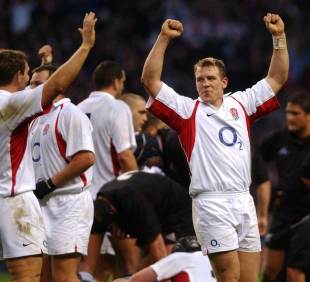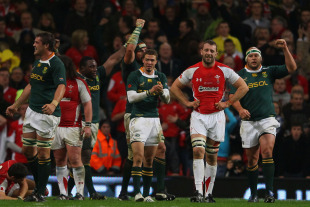|
Numbers Game
A decade of dominance
Huw Richards
October 23, 2012

England celebrate their win over the All Blacks in 2002
© Getty Images
Enlarge
So well established is the autumn international programme in rugby's contemporary calendar that it comes as a shock to recall that, like the Heineken Cup, it is less than 20 years old and a product of the game's professional era. The forces that got all of the southern hemisphere's giants visiting most years were those which dominated the somewhat panicky years of the new settlement - a desperate search for new income with which to fund vastly increased costs. Only an extended international programme could be counted upon to do that. So it is that when autumn matches resume this month after their World Cup year sabbatical in 2011, fans in Europe will be able to see not only the Boks, All Blacks and Wallabies, but the Pumas, Fiji and Samoa. The extent of the transformation can be seen by comparing international records pre and post 1995. When Ireland entertain South Africa at the Aviva Stadium on November 10, it will be the 119th clash between one of the former Five Nations and one of the three traditional southern giants since 1995, an average of seven matches per year over 17 years. The 90 years between the pioneering All Blacks and the change of 1995 saw 148 matches, an average of 1.64 per year, or less than a quarter of the rate of more recent teams. Take out the years lost to war, and the average still comes out at less than two. What has not changed is a pattern of southern dominance. We get reminded of it much more frequently when all three visit most years, compared to the pattern of one each per decade that held until the 1970s, but there's not a massive difference between pre and post 1995 results. The southern trio won 93 and lost 47, with 8 draws of the pre-professional matches. They've done a little better since 1995, winning 81 to 32 with five draws, but there is only a five per cent difference - 70.76% against 65.54 - in their winning percentage. Those five draws, three involving Australia and two New Zealand, are a genuine oddity given that the drawn game has become such a rarity in modern rugby. As so often with historical statistics, the breathtaking element is the dominance of the All Blacks. Over the entire period, their winning record as an away team against the Five Nations has been 82.96%. They have played 91 matches and won 73, with only 13 defeats. So great a collector's item is an All Black defeat that well-informed fans of the winning teams can usually reel off the years - 1905, 1935 and 1953 for Wales, 1936, 1983, 1993 and 2002 for England. On November 9 they will complete a decade since they lost away to any of the Five Nations (the loss against France in the 2007 World Cup was on neutral ground, in Wales). That is also long enough for most of us to have forgotten that this most recent loss was against an immensely strong England squad missing only one man - Josh Lewsey - of the 15 who started the World Cup final a year later, while All Black coach John Mitchell had chosen to bring an experimental squad and handed debuts to seven players, of whom only Andrew Hore and Ali Williams were to have long international careers. Even then they scored four tries to three and led by 12 points before a late England revival.
South Africa has been the second most successful visitor, while playing fewer matches because there were none between 1974 and 1992. They have won 53 and lost 23 of their 80 matches for a 68.75% success record. Australia brings up the rear with 52.63%, 48 wins to 43 defeats in 95 matches. What has changed between the pre and post 1995 eras is the relative fortunes of the teams. New Zealand had the best record to 1995, but not by much - 79.09% to South Africa's 76.31, which included a 23-match unbeaten run between losses to Scotland in 1906 and Ireland in 1965, while Australia lost more matches than they won for a 44.55% record. New Zealand's professional record is little sort of stupefying, only three defeats - England in 2002, France in 1995 and 2000 - in 36 matches, of which 31 have been won and two drawn, a success rate of 88.89%. Australia has done much better, and its 63.75% from 40 matches just edges out the Springboks' 63.41% from 42, of which 26 have been won. Among the battered hosts, England and France have the best records, both just over 40%. England have a marginal edge, but will lose it - albeit with a chance to leapfrog back a week later - should France beat Australia on November 10. France, with 12 wins in 21 matches, have the best record against Australia and their six wins in 23 is comfortably the best against New Zealand. England, with eight wins and a draw in 18 matches, have been far by the Springboks' most troublesome adversary.

The sight of South Africa celebrating at the MIllennium Stadium is nothing new
© Getty Images
Enlarge
Scotland was little behind France and England pre-1995, but has struggled since, winning only three out of 21 matches to drop its all-time percentage to 27.08%. Ireland had by far the worst pre-1995 record but has done much better since, including a 50% record against the Springboks to raise its overall record to 24.41%. That leaves Wales, most unusually for an all-time Five Nations table, in last place on 24.07%, weighed down by an abysmal record against South Africa - with only a single victory, in a half-completed Millennium Stadium in 1998, in 16 meetings. Three wins and a draw from 26 matches mean they edge out Scotland as the most accommodating hosts of the professional era. England's record of 43.33% since 1995 conceals the one period in which a European team has truly dominated Southern visitors. Their record as host during Clive Woodward's period as coach (1997 to 2004, when his resignation coming ahead of the autumn matches in 2004) was P14 W8 D2 L4, a success rate of 64.29%. Their record otherwise in professional times has been a slightly less impressive four wins from 16 matches, or 25%. Three wins from nine meetings this autumn would hold up Europe's rather unimpressive historic average, and indeed slightly improve the professional record. Both history and current form suggest those defeats are likelier to be inflicted on Australia or South Africa. Any All Black defeat, particularly if they go down for the first time ever to Scotland or the first in 59 years to Wales, would go straight into rugby history. On average they go down roughly once every eight and a quarter years - 13 times in 107 years. But looked at another way, they're due, given the decade that has elapsed since they went down at Twickenham in November 2002. © ESPN Sports Media Ltd.
|
Live Sports
Communication error please reload the page.
-
Football
-
Cricket
-
Rugby
-
- Days
- Hrs
- Mins
- Secs
F1 - Abu Dhabi GP
Abu Dhabi Grand Prix December 11-131. Max Verstappen ()
2. Valtteri Bottas (Mercedes)
3. Lewis Hamilton (Mercedes)
4. Alexander Albon ()
5. Lando Norris ()
6. Carlos Sainz Jr ()
-
ESPNOtherLive >>
Snooker - China Open
Tennis - Miami Open

